 Libri di Carlos Steel su Unilibro.it) Libri di Carlos Steel su Unilibro.it)
|
|
2024 |
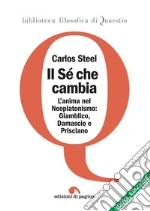 Title :
Il sé che cambia. L'anima nel tardo neoplatonismo: Giamblico, Damascio e Prisciano. Nuova ediz.
Title :
Il sé che cambia. L'anima nel tardo neoplatonismo: Giamblico, Damascio e Prisciano. Nuova ediz.Author: Steel Carlos Publisher: Edizioni di Pagina «Conosci Te stesso». Ma qual è il mio Io? O qual è il mio «vero Io»? Giacché «noi siamo molte cose», come dice Plotino: l'unione di corpo e anima, l'anima con i suoi desideri, le sue passioni e i suoi pensieri, l'intelletto, l'Uno stesso. L'anima non sembra avere un'essenza stabile: posta fra il sensibile e l'intelligibile, può diventare tutto ciò verso cui rivolge la propria attenzione. Discendendo nel corpo, l'anima muta persino nella sua sostanza, eppure, nonostante tutti i cambiamenti, rimane se stessa. Il concetto dell'anima e del Sé occupa un posto centrale nella filosofia neoplatonica da Plotino in poi, e ha continuato a suscitare vivaci discussioni fino agli ultimi rappresentanti della scuola neoplatonica ateniese. € 20,00
|
|
|
1918 |
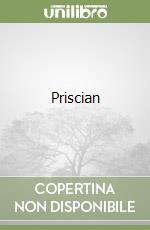 Title :
Priscian
Title :
PriscianAuthor: Huby Pamela (EDT), Ebbesen Sten (EDT), Langslow David (EDT), Russell Donald (EDT), Steel Carlos (EDT) Publisher: Bloomsbury USA Academic € 34,70
|
|
|
1915 |
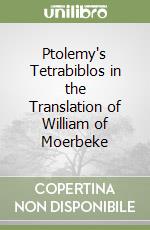 Title :
Ptolemy's Tetrabiblos in the Translation of William of Moerbeke
Title :
Ptolemy's Tetrabiblos in the Translation of William of MoerbekeAuthor: Vuillemin-Diem Gudrun (EDT), Steel Carlos (EDT), De Leemans Pieter (CON) Publisher: Leuven Univ Pr € 95,60
|
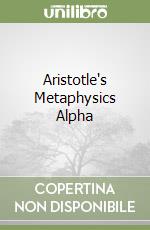 Title :
Aristotle's Metaphysics Alpha
Title :
Aristotle's Metaphysics AlphaAuthor: Steel Carlos (EDT), Primavesi Oliver (CON) Publisher: Oxford University Press € 58,40
|
|
1914 |
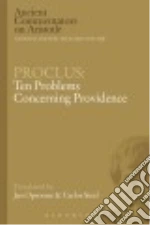 Title :
Proclus
Title :
ProclusAuthor: Opsomer Jan (TRN), Steel Carlos (TRN) Publisher: Bloomsbury USA Academic 'The universe is, as it were, one machine, wherein the celestial spheres are analogous to the interlocking wheels and the particular beings are like the things moved by the wheels, and all events are determined by an inescapable necessity. To speak of free choice or self determination is only an illusion we human beings cherish.' Thus writes Theodore the engineer to his old friend Proclus, one of the last major Classical philosophers. Proclus' reply is one of the most remarkable discussions on fate, providence and free choice in Late Antiquity. It continues a long debate that had started with the first polemics of the Platonists against the Stoic doctrine of determinism. How can there be a place for free choice and moral responsibility in a world governed by an unalterable fate? Proclus discusses ten problems on providence and fate, foreknowledge of the future, human responsibility, evil and punishment (or seemingly absence of punishment), social and individual responsibility for evil, and the unequal fate of different animals. Until now, despite its great interest, Proclus' treatise has not received the attention it deserves, probably because its text is not very accessible to the modern reader. It has survived only in a Latin medieval translation and in some extensive Byzantine Greek extracts. This first English translation, based on a retro-conversion that works out what the original Greek must have been, brings the arguments he formulates again to the fore. € 40,00
|
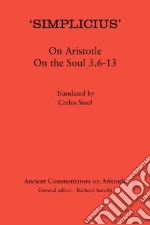 Title :
Simplicius
Title :
SimpliciusAuthor: Steel Carlos (TRN), Ritups Arnis (COL) Publisher: Bloomsbury USA Academic This is the fourth and last volume of the translation in this series of the commentary on Aristotle On the Soul, wrongly attributed to Simplicius. Its real author, most probably Priscian of Lydia, proves in this work to be an original philosopher who deserves to be studied, not only because of his detailed explanation of an often difficult Aristotelian text, but also because of his own psychological doctrines. In chapter six the author discusses the objects of the intellect. In chapters seven to eight he sees Aristotle as moving towards practical intellect, thus preparing the way for discussing what initiates movement in chapters nine to 11. His interpretation offers a brilliant investigation of practical reasoning and of the interaction between desire and cognition from the level of perception to the intellect. In the commentator's view, Aristotle in the last chapters (12-13) investigates the different type of organic bodies corresponding to the different forms of life (vegetative and sensory, from the most basic, touch, to the most complex). € 38,30
|
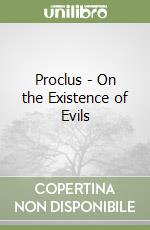 Title :
Proclus - On the Existence of Evils
Title :
Proclus - On the Existence of EvilsAuthor: Steel Carlos, Opsomer Jan Publisher: Bloomsbury USA Academic € 38,30
|
|
2009 |
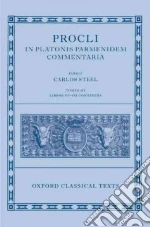 Title :
Procli in Platonis Parmenidem Commentaria
Title :
Procli in Platonis Parmenidem CommentariaAuthor: Steel Carlos (EDT) Publisher: Oxford University Press The Commentary on Plato's Parmenides by Proclus (AD 412-85) is the most important extant document on the interpretation of this enigmatic dialogue, and has had a crucial influence on all subsequent readings. In Proclus' Commentary, the Parmenides provides the argumentative and conceptual framework for a scientific theology wherein all mythological discourse about the gods can be integrated. Its exposition was therefore the culmination of the curriculum of the Platonic school. This theological reading of the Parmenides persisted, through the medium of Ficino, until the nineteenth century. Previously this important text was only accessible in the edition of V. Cousin (Paris, 1864). This new critical edition is based on an exhaustive study of both the Greek tradition and the medieval Latin translation. This volume, the third and final one, contains Books VI and VII, and a complete set of indexes. € 82,90
|
|
|
2007 |
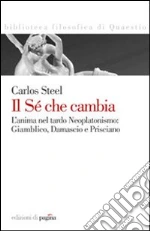 Title :
Il sé che cambia. L'anima nel tardo neoplatonismo: Giamblico, Damascio e Prisciano
Title :
Il sé che cambia. L'anima nel tardo neoplatonismo: Giamblico, Damascio e PriscianoAuthor: Steel Carlos Publisher: Edizioni di Pagina 'Conosci Te stesso'. Ma qual è il mio Io? O qual è il mio 'vero Io'? Giacché «noi siamo molte cose», come dice Plotino: l'unione di corpo e anima, l'anima con i suoi desideri, le sue passioni e i suoi pensieri, l'intelletto, l'Uno stesso. L'anima non sembra avere un'essenza stabile: posta fra il sensibile e l'intelligibile, può diventare tutto ciò verso cui rivolge la propria attenzione. Discendendo nel corpo, l'anima muta persino nella sua sostanza, eppure, nonostante tutti i cambiamenti, rimane se stessa. Il concetto dell'anima e del Sé occupa un posto centrale nella filosofia neoplatonica da Plotino in poi, e ha continuato a suscitare vivaci discussioni fino agli ultimi rappresentanti della scuola neoplatonica ateniese. € 17,00
|
|
|
2006 |
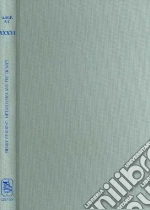 Title :
Henry of Ghent
Title :
Henry of GhentAuthor: Carlos, Steel Publisher: BERTRAMS PRINT ON DEMAND Ancient and Medieval Philosophy, Series 1, No. 36 Henry of Ghent stands out as a leading thinker, together with Thomas Aquinas and Bonaventure, of the second half of the thirteenth century. His rich and multifaceted thought influenced many different traditions; he has been seen as an eclectic. This book elucidates Henry of Ghent's philosophical and theological system with special reference to his Trinitarian writings. It also shows how Henry (d. 1293), the most influential theologian of his day in Paris, developed the Augustinian tradition in response to the Aristotelian tradition of Aquinas. € 30,90
|
|
|
2003 |
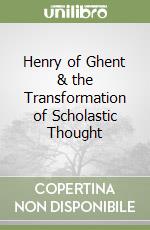 Title :
Henry of Ghent & the Transformation of Scholastic Thought
Title :
Henry of Ghent & the Transformation of Scholastic ThoughtAuthor: Guldentops Guy (EDT), Steel Carlos G. (EDT), Decorte J. (EDT) Publisher: Leuven Univ Pr € 81,00
|